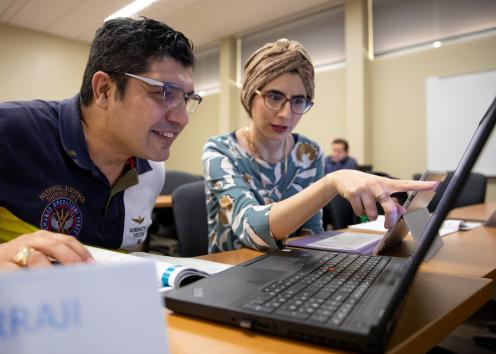Master's in Higher Education Administration at KU

Program Overview
The master's degree in higher education administration at KU is designed to prepare education professionals to thrive in administrative positions at colleges or universities. The graduate program allows students to extend and apply their knowledge of colleges and universities. It also provides students the chance to learn from expert scholars and practitioners, as well as fellow classmates, who bring diverse leadership experiences to the program.
Enrollment Status Benefits
Full-time enrollment
Full-time students enroll in a cohort-based program with two years of hands-on graduate assistantship experience. Graduate assistantships include a full tuition waiver of up to 18 credits during the academic year.
Additional terms and conditions apply.
Part-time enrollment
Current college or university professionals who work full time in higher education environments can enroll any semester with rolling admission.
Career Outcomes in Higher Education Administration
After completing their master’s program, students who aspire to careers in educational leadership are likely to accept positions in areas similar to the following:
- Academic advising
- Residence life and housing
- Student conduct
- Financial aid
- Admissions and enrollment management
- Health and wellness
- Student involvement, activities, and leadership
- Multicultural and diversity services
- Orientation and transition programs
- Fraternity and sorority life
Also, many graduate students who complete the master’s degree in higher education administration decide to pursue doctoral programs in areas such as student affairs, educational policy, business management, and more.
Graduate Assistantship
Full-time students admitted to the master’s degree program are required to have a graduate assistantship at KU to matriculate. Assistantships typically require 20 to 30 hours per week, and students will receive a tuition waiver, health insurance, and a stipend. (Note: Housing positions also receive room and board.)
The graduate assistantship application requires a cover letter, a resume, and at least three references. Following admission decisions, invited students will participate in the assistantship process, including visiting campus and interviewing in person during Higher Education Graduate Assistant (HEGA) Days in mid-February.
Many assistantship opportunities exist on campus, and specific availability varies by year. Students in the program consistently have positions in such offices as residence life, student conduct, fraternity and sorority life, multicultural affairs, financial aid, academic advising, orientation and transfer programs, and admissions.
Career Outcomes in Higher Education Administration
After completing their master’s program, students who aspire to careers in educational leadership are likely to accept positions in areas similar to the following:
- Academic advising
- Residence life and housing
- Student conduct
- Financial aid
- Admissions and enrollment management
- Health and wellness
- Student involvement, activities, and leadership
- Multicultural and diversity services
- Orientation and transition programs
- Fraternity and sorority life
Also, many graduate students who complete the master’s degree in higher education administration decide to pursue doctoral programs in areas such as student affairs, educational policy, business management, and more.
Graduate Assistantship
Full-time students admitted to the master’s degree program are required to have a graduate assistantship at KU to matriculate. Assistantships typically require 20 to 30 hours per week, and students will receive a tuition waiver, health insurance, and a stipend. (Note: Housing positions also receive room and board.)
The graduate assistantship application requires a cover letter, a resume, and at least three references. Following admission decisions, invited students will participate in the assistantship process, including visiting campus and interviewing in person during Higher Education Graduate Assistant (HEGA) Days in mid-February.
Many assistantship opportunities exist on campus, and specific availability varies by year. Students in the program consistently have positions in such offices as residence life, student conduct, fraternity and sorority life, multicultural affairs, financial aid, academic advising, orientation and transfer programs, and admissions.

The faculty within my program are supportive not only in my curriculum, but also the aspects of career development in preparation for graduation. They provide opportunities to engage with research, develop projects and programs, and assist in career aspirations.
Statistics
U.S. News & World Report’s “Best Graduate Schools,” 2025-26





